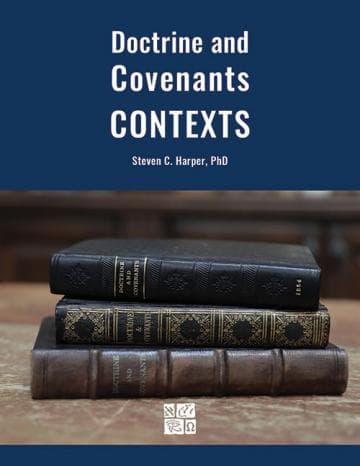Book
136 Chapters

Martin Harris was “one of the most respected farmers in Wayne County,” a prosperous, property-owning Palmyran since 1808.[1] In summer 1829 Martin and Joseph agreed to terms with a Palmyra printer named Egbert Grandin to publish the Book of Mormon. It was a controversial book and they wanted to print a large run of 5,000 copies.
Martin led the negotiations and planned to pay for the printing, but he balked when Grandin refused to begin work until he had security for the entire payment.[2] They worked out an agreement in which Grandin would print and bind all 5,000 copies of the book for $3,000, with Martin putting up more than 150 acres of land as collateral. That’s when Martin “staggered in his confidence.”[3] He would have to mortgage all the land he owned outright. The marvelous work halted for most of the summer.
Martin worried the no one would buy the books and he would lose his farm. “I want a commandment,” he told Joseph, “I must have a commandment.” So Joseph asked and the Lord gave a commandment, section 19.[4] In a word, the commandment was “repent.” Frequent, intense repetition of “I command” and “repent” dominate this text. It offers astonishing autobiographical insight into the Savior’s Atonement. It begins in the voice of the Almighty Christ. First, he clarifies a mystery, or a common debate at the time about whether God’s punishment would last forever or not. Didn’t the word eternal obviously mean “never-ending,” proponents might argue? Not necessarily, the Lord answers. Consider that it can be a qualitative measure as well as a quantitative one. The acts of Christ’s suffering and being resurrected didn’t last forever, and yet they have eternal consequences. Punishment, perhaps, can be limited in duration and yet lasting in effect. Moreover, Christ says, eternal “is more express” than other words (D&C 19:7).
With that, the Savior begins to make his intended point powerfully. He repeatedly commands Martin to repent because Christ suffered exquisitely so that he could. This is the best autobiographical description of the Savior’s atoning suffering in the scriptures. It is wrenching, beautiful, and powerful. Compare section 18, for example, where the Savior speaks briefly and modestly in the third person voice to describe how he suffered the pain of all so that all might repent (D&C 18:10–13). It’s the same doctrine declared by the same Christ but in an entirely different voice and tone. Section 19 is adapted to Martin’s present predicament, which Christ knows how to address.
Throughout section 19 there is subtle allusion in which Christ compares himself to Martin implicitly. As Martin wrestles with whether he should keep his promises, and whether the sacrifice asked of him is too great, the Savior declares his character: he keeps promises. He made the infinite sacrifice. Where Martin is concerned with carnal security, the Savior shows contempt for covetousness. Where Martin is coveting his own property, the Lord compares it to the priceless testament of Jesus Christ, the “Book of Mormon, which contains the truth and word of God” (D&C 19:26).
This revelation reoriented Martin Harris. He grasped what the Lord was saying so expressly. He learned to let this commandment suffice and not ask again (D&C 19:32). He obeyed the Lord’s command to “not covet thine own property, but impart it freely to the printing” (D&C 19:26). He mortgaged his farm on August 25, paying Grandin in full.[5] Once the paperwork was finished, Grandin's employees began printing. The marvelous work was back on track.
[1] Pomeroy Tucker, Origin, Rise, and Progress of Mormonism: Biography of Its Founders and History of Its Church (New York: D. Appleton, 1867), 41, 50.
[2] John H. Gilbert, Memorandum, September 8, 1892, photocopy, MS 9223, Church History Library, Salt Lake City. “Mormon Leaders at Their Mecca,” New York Herald, June 25, 1893, 12.
[3] Tucker, Origin, Rise, and Progress of Mormonism, 51.
[4] Joseph Knight, Sr. Reminiscences, no date. MS 3470, Church History Library, Salt Lake City.
[5] Martin Harris, Mortgage to Egbert B. Grandin, August 25, 1829, Mortgages, Liber 3, 325, Wayne County Clerk's Office, Lyons, New York.
Book
136 Chapters
Items in the BMC Archive are made publicly available for non-commercial, private use. Inclusion within the BMC Archive does not imply endorsement. Items do not represent the official views of The Church of Jesus Christ of Latter-day Saints or of Book of Mormon Central.